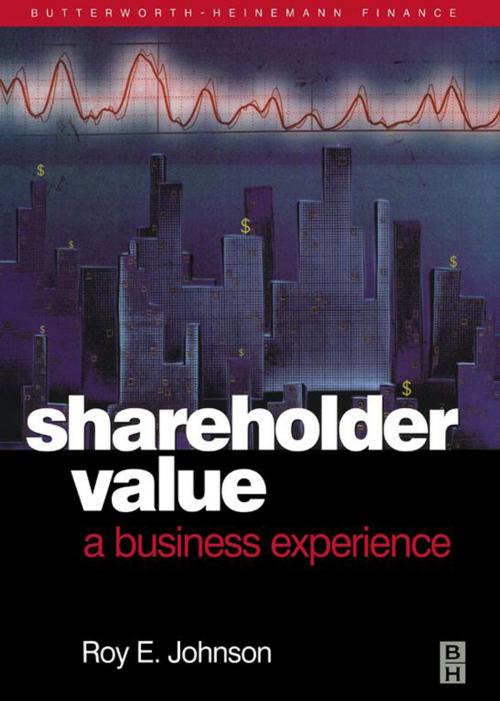Shareholder Value - A Business Experience
Business & Finance, Finance & Investing, Corporate Finance, Management & Leadership, Management| Author: | RoyE. Johnson, BA, Upsala College;MBA, Rutgers University. | ISBN: | 9780080498133 |
| Publisher: | Elsevier Science | Publication: | October 23, 2001 |
| Imprint: | Butterworth-Heinemann | Language: | English |
| Author: | RoyE. Johnson, BA, Upsala College;MBA, Rutgers University. |
| ISBN: | 9780080498133 |
| Publisher: | Elsevier Science |
| Publication: | October 23, 2001 |
| Imprint: | Butterworth-Heinemann |
| Language: | English |
Shareholder Value presents a powerful and useful toolkit of market-based perspectives, analytic approaches, valuation techniques, and specific financial metrics for use in everyday business life.
The author helps a broad spectrum of professionals understand the salient points and real world implications of a 'value management' movement which has taken hold in many corporations in the United States and around the world. This movement is being supported by some of the major institutional investors who influence financial markets.
The main goal of 'Shareholder Value' is to help working professionals grasp the concept of value 'creators' and 'destroyers', along with the implications. He also provides tools to measure the success (or failure) of major strategic and operational initiatives and enables corporate managers to understand how shareholder value is created, and then directs behaviour toward 'value-based' planning and action.
Although mainly aimed at the professional market, 'Shareholder Value' will also be of use to students of business and finance as it is intended to provide a comprehensive foundation for important elements of business strategy and acquisition valuation, corporate financial analysis, capital investments, corporate financing and economic value based metrics. AUTHOR'S REVIEW: When developing this book, I strived to achieve the following:
- Provide the finance professional and student of finance with a comprehensive template of shareholder value concepts and techniques - geared toward use in a corporate setting
- Give the non-financial professional an understanding of the underpinnings and behavioural aspects of economic value management
- Outline and provide details of an effective process for implementing a value-based financial performance system within a corporation
- ...And, combine learning with enjoyable reading by presenting technical material through a story.
The "story" and "characters" are unique features of Shareholder Value - A Business Experience. The reader can get an appreciation of the environment surrounding value-based management, along with challenges that arise when transitioning from traditional "accounting" performance (where earnings and earnings per share reign supreme) to "economic" performance (where cash flow and return on investment are emphasized). Characters occupying operating and staff roles have been created to represent people that those working inside companies (large, medium and small) may encounter and, also, to invoke some humour. Insights into how to function in different corporate roles can be gained by following the characters through the story.
- Presents a combination of analysis and case study in which a strong technical treatment is blended with a fictional case study to offer clarity and explanation
- A practical and effective implementation process for a comprehensive financial performance system
- Offers a perspective of the role of different corporate and business unit functions in the implementation of value-based financial performance within a company
Shareholder Value presents a powerful and useful toolkit of market-based perspectives, analytic approaches, valuation techniques, and specific financial metrics for use in everyday business life.
The author helps a broad spectrum of professionals understand the salient points and real world implications of a 'value management' movement which has taken hold in many corporations in the United States and around the world. This movement is being supported by some of the major institutional investors who influence financial markets.
The main goal of 'Shareholder Value' is to help working professionals grasp the concept of value 'creators' and 'destroyers', along with the implications. He also provides tools to measure the success (or failure) of major strategic and operational initiatives and enables corporate managers to understand how shareholder value is created, and then directs behaviour toward 'value-based' planning and action.
Although mainly aimed at the professional market, 'Shareholder Value' will also be of use to students of business and finance as it is intended to provide a comprehensive foundation for important elements of business strategy and acquisition valuation, corporate financial analysis, capital investments, corporate financing and economic value based metrics. AUTHOR'S REVIEW: When developing this book, I strived to achieve the following:
- Provide the finance professional and student of finance with a comprehensive template of shareholder value concepts and techniques - geared toward use in a corporate setting
- Give the non-financial professional an understanding of the underpinnings and behavioural aspects of economic value management
- Outline and provide details of an effective process for implementing a value-based financial performance system within a corporation
- ...And, combine learning with enjoyable reading by presenting technical material through a story.
The "story" and "characters" are unique features of Shareholder Value - A Business Experience. The reader can get an appreciation of the environment surrounding value-based management, along with challenges that arise when transitioning from traditional "accounting" performance (where earnings and earnings per share reign supreme) to "economic" performance (where cash flow and return on investment are emphasized). Characters occupying operating and staff roles have been created to represent people that those working inside companies (large, medium and small) may encounter and, also, to invoke some humour. Insights into how to function in different corporate roles can be gained by following the characters through the story.
- Presents a combination of analysis and case study in which a strong technical treatment is blended with a fictional case study to offer clarity and explanation
- A practical and effective implementation process for a comprehensive financial performance system
- Offers a perspective of the role of different corporate and business unit functions in the implementation of value-based financial performance within a company















